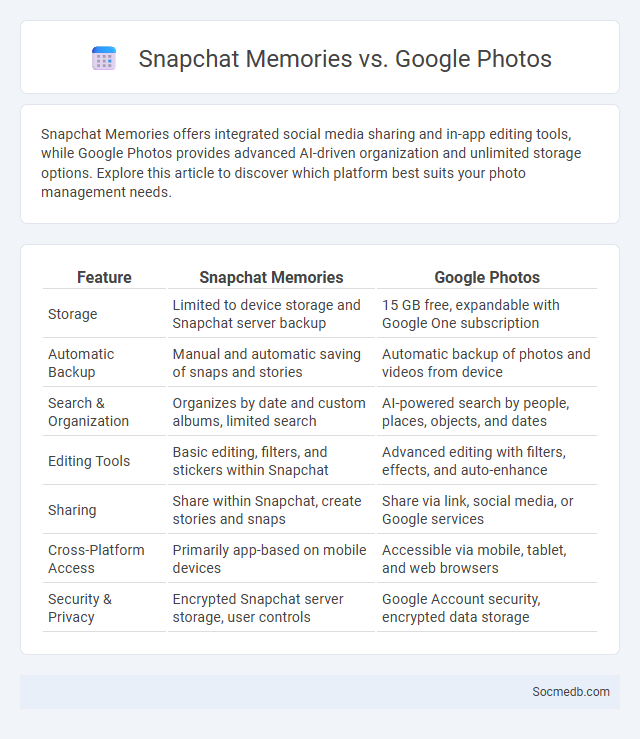
Photo illustration: Snapchat Memories vs Google Photos
Snapchat Memories offers integrated social media sharing and in-app editing tools, while Google Photos provides advanced AI-driven organization and unlimited storage options. Explore this article to discover which platform best suits your photo management needs.
Table of Comparison
| Feature | Snapchat Memories | Google Photos |
|---|---|---|
| Storage | Limited to device storage and Snapchat server backup | 15 GB free, expandable with Google One subscription |
| Automatic Backup | Manual and automatic saving of snaps and stories | Automatic backup of photos and videos from device |
| Search & Organization | Organizes by date and custom albums, limited search | AI-powered search by people, places, objects, and dates |
| Editing Tools | Basic editing, filters, and stickers within Snapchat | Advanced editing with filters, effects, and auto-enhance |
| Sharing | Share within Snapchat, create stories and snaps | Share via link, social media, or Google services |
| Cross-Platform Access | Primarily app-based on mobile devices | Accessible via mobile, tablet, and web browsers |
| Security & Privacy | Encrypted Snapchat server storage, user controls | Google Account security, encrypted data storage |
Introduction to Digital Photo Storage Solutions
Digital photo storage solutions offer efficient ways to organize, save, and access images across various devices and platforms. Cloud-based services such as Google Photos, Dropbox, and Amazon Photos provide scalable storage with automatic backup and easy sharing capabilities. Advanced features include AI-powered tagging, facial recognition, and cross-device synchronization to streamline photo management for personal and professional use.
Overview: Snapchat Memories vs Google Photos vs iOS Memories
Snapchat Memories offers a unique feature for saving and organizing snaps and stories within the app, enabling users to easily search and share past moments with friends. Google Photos provides robust cloud storage with advanced AI-powered search, automatic backups, and seamless integration across devices, making it ideal for comprehensive photo management. iOS Memories leverages on-device machine learning to curate personalized photo collections and highlights within the Photos app, emphasizing privacy and deep integration with the Apple ecosystem.
Storage Capacity and Management
Modern social media platforms utilize expansive cloud-based storage systems capable of managing petabytes of user-generated content including images, videos, and messages. Efficient data management employs advanced algorithms for indexing, compression, and real-time retrieval to enhance performance and user experience. Scalable storage architectures and automated data lifecycle policies ensure seamless handling of growing volumes while maintaining data integrity and accessibility.
User Interface and Experience
A well-designed social media User Interface (UI) prioritizes intuitive navigation and visually appealing layouts to enhance user engagement. Optimizing Your experience involves streamlined content discovery, personalized feeds, and minimal loading times to keep interactions seamless. Responsive design across devices ensures that users can access platforms effortlessly, boosting satisfaction and retention.
Backup and Sync Capabilities
Social media platforms increasingly integrate robust backup and sync capabilities to ensure seamless data protection and accessibility across devices. Real-time synchronization facilitates automatic updates of posts, messages, and multimedia content, minimizing data loss risks and enhancing user experience. Advanced cloud-based backup solutions offer secure storage and easy recovery options, critical for managing vast amounts of user-generated content.
Privacy and Security Features Comparison
Social media platforms implement varied privacy and security features, including end-to-end encryption, two-factor authentication, and customizable privacy settings to control data sharing. Facebook offers extensive controls over data visibility and robust security measures, while Snapchat emphasizes ephemeral content and encrypted communication. Twitter provides user-centric options like protected tweets and login verification, but has faced challenges with account breaches and misinformation.
Organization and Search Functions
Social media platforms utilize advanced organization and search functions to enhance user experience by categorizing content through hashtags, tags, and metadata. Algorithms prioritize relevant posts based on user behavior, preferences, and interactions, enabling efficient content discovery. Robust search engines within platforms support keyword, location, and hashtag queries, facilitating real-time access to trending topics and personalized information streams.
Sharing and Collaboration Options
Social media platforms offer diverse sharing and collaboration options, enabling users to easily distribute multimedia content such as photos, videos, and articles across networks. Features like group chats, collaborative documents, and real-time editing foster interactive communication and teamwork. Integration with cloud services and third-party apps enhances seamless collaboration and content sharing among individuals and communities worldwide.
Unique Features and Integrations
Social media platforms offer unique features like live streaming, Stories, and augmented reality filters that enhance user engagement and content sharing. Integrations with e-commerce, analytics tools, and third-party apps enable seamless brand promotion and performance tracking. Your experience benefits from personalized algorithms and cross-platform connectivity, optimizing interaction and reach.
Which Photo Storage Solution Is Best for You?
Choosing the best photo storage solution for social media depends on factors like storage capacity, accessibility, and integration with platforms. Cloud services such as Google Photos and Apple iCloud offer automatic backup, easy sharing options, and advanced search capabilities powered by AI. For professionals, Adobe Creative Cloud combines storage with powerful editing tools, while external hard drives provide offline security for large photo archives.
 socmedb.com
socmedb.com